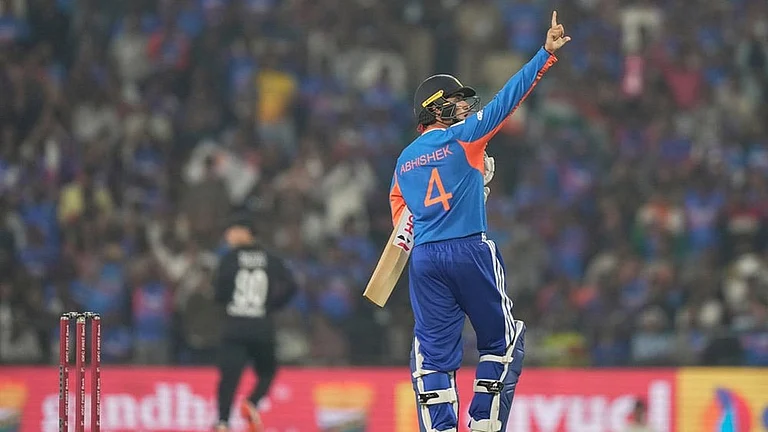What was supposed to be the easy half of Noah Lyles' historic Olympic sprint double isn't looking quite so easy anymore. (Medal Table | Schedule & Results | Full Coverage)
Newly crowned the Fastest Man Alive after a close-as-can-be win by five thousandths of a second in the 100 meters at the 2024 Games, Lyles was not even the fastest man in his semifinal of the 200 on Wednesday night. He was good enough to make it into that event's final, anyway.
The 200 is Lyles' preferred, and better, distance — one at which he had not lost a race in three full years. That streak was snapped at the Stade de France, where Letsile Tebogo of Botswana beat him to the line by crossing in 19.96 seconds, 0.12 faster than runner-up Lyles.
They'll have a rematch for the gold on Thursday night.
Getting golds in the 100 and 200 at a single Olympics is a rare feat. Usain Bolt accomplished that double at three Olympics in a row — in Beijing in 2008, London in 2012 and Rio de Janeiro in 2016. But until the Jamaican, no man had done it since Carl Lewis at Los Angeles in 1984.
At his last Games, eight years ago, Bolt was shutting it down late in his 200 semifinal, and suddenly realized Andre De Grasse was running hard. So Bolt dialed his speed back up and wagged a finger at the Canadian. Fast-forward to the final: Bolt won easily.
Before pulling out his narrow win over Jamaica's Kishane Thompson in the 100 final on Sunday night, Lyles didn't finish first in his heat or his semifinal.
As anyone who pays any attention is well aware, Lyles is a showman who loves the spotlight and enjoys spending time with a microphone.
That's obvious from his mean-mugging and gesturing on the purple track in Paris before he runs or such statements as the off-hand comparison between track and the NBA that went viral last year: “The thing that hurts me the most is I have to watch the NBA Finals and they have World Champion' on their head,” Lyles said. “World champion of what? The United States?”
So it raised some eyebrows when Lyles skipped the interview area after Wednesday's run, and U.S. team officials said he was heading to the medical tent. His coach, Lance Brauman, told The Associated Press: “He's fine.”
That might just add a bit more intrigue in the 24 hours until the medals are at stake.
There already was plenty.
Is Lyles, a 27-year-old from Florida, at his best? How much did he care about the semifinal, when lane placements are determined but all that truly matters is moving on to the round that determines the medals? Will Lyles find some extra fuel from being outdone in front of a full house of about 80,000?
Was the 21-year-old Tebogo, the 200 bronze medalist at worlds but making his Olympic debut, trying to send a message? Is he ready to challenge for a gold?
And what about Kenny Bednarek, Lyles' U.S. teammate and the Tokyo Games silver medalist, who ran in a different semifinal and won it in 20 seconds flat, the evening's second-fastest time? Or Erryion Knighton, a 20-year-old American seen as the next threat, but whose only victories over Lyles came in the opening rounds of the 2021 Olympic trials.
At the last Olympics, Lyles finished behind Bednarek and champion De Grasse in the 200. On Wednesday, De Grasse was third in Bednarek's heat with a time too slow to reach the final.
Afterward, De Grasse mentioned a hamstring issue that resurfaced. He also was asked about his American coach, Rana Reider, getting kicked out of the Paris Games after the Canadian Olympic Committee said it “learned of new information about the appropriateness of Mr. Reider remaining accredited.” Reider was investigated for alleged sexual misconduct by the U.S. Center for SafeSport and placed on a one-year probation that ended in May.
“I tried to keep my head and stay mentally strong," De Grasse said, "but of course, that's always a tough one, not having your coach out there with you.”



























